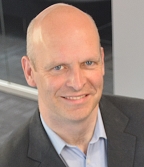People of ACM European Chapters - Steven Bradley
October 9, 2018
Can you briefly describe your own line of research and how you became interested in this area?
Over the years I have been involved in many areas of research, often working with interdisciplinary teams. One such area that I am currently working on is enabling citizen science—scientific research conducted by non-professional scientists. Our current project, MammalWeb, uses camera trap data to support the understanding of ecology, especially mammals. Working with academic colleagues from biology, as well as with people from charitable trusts and government departments, has been a real eye-opener.
My main area of research is computer science education. Primarily, this work stems from my perspective as a practitioner in higher education. I research questions around assessment, including automating assessment and plagiarism, as well as how to write assignments which are fulfilling and amenable to analysis by plagiarism detection tools. I am also interested in CS education in schools in general, and inclusion in particular, where my focus is on using music in computing to encourage broad participation and learnings.
In your area of research, what recent advance/emerging subfield will yield important advances in the years ahead?
Having moved into computing education research from a traditional computer science background, I realized these are two very different worlds. In computing education research, data tend to be more qualitative and theories tend to be more explanatory than the predictive conclusions you arrive at in computer science. However, as neuroscience develops and interacts more with education, we can hope to better understand what motivates people to study, and how best to support that learning. Perhaps we will then be able to understand interesting and emerging observations, such as recent research suggesting that if you take people who are struggling to learn programming, and give them a course to develop their spatial skills, their results in programming will improve markedly—as was outlined in “Investigating the Relationship Between Spatial Skills and Computer Science”.
Will you tell us a little about the UK and Ireland ACM SIGCSE Chapter?
We formed the chapter earlier this year (February 2018) to reflect the growing interest in computer science education in the UK and Ireland. In 2014, an entirely new curriculum was introduced in English schools for ages five to 18, and there are parallel developments elsewhere. At the same time, university computing departments, which saw such a decline in applications post-2000, are now growing rapidly. We have about 50 members, mostly from university departments, whom we try to keep in touch with and support. The Computing Education Practice conference takes place each January in Durham [UK], and will eventually be sponsored by our chapter. We are also planning an education research conference in September 2019.
How is participation in the chapter beneficial to members?
As well as keeping in touch through conferences, we have occasional twitter meetups to discuss hot topics. University departments are usually driven by their technical research, but teaching is a crucially important part of what we do. There are many challenges in teaching our subject, because it is young and less well understood than the more established disciplines, and because the nature of both the subject and its students is changing so rapidly. Our new SIGCSE chapter provides everyone with support and a sounding board to develop their thinking further—support they may not routinely get within their own research environments.

Steven P. Bradley is an Associate Professor, Department of Computer Science, at Durham University (UK), where he is part of the Innovative Computing Research Group. His research interests include computer science education; knowledge representation and student learning; real-time systems; and software engineering. Bradley has co-authored conference papers and journal articles on topics including managing plagiarism in programming assignments, software evolution in interdisciplinary environments, and utilizing data-driven learning in teaching chemistry.
His honors include receiving Durham University’s Excellence in Learning and Teaching Award and receiving a grant from Google for a project to introduce computer science in high schools. Bradley serves as the Chair of the recently-formed UK and Ireland Chapter of the ACM Special Interest Group on Computer Science Education (SIGCSE).